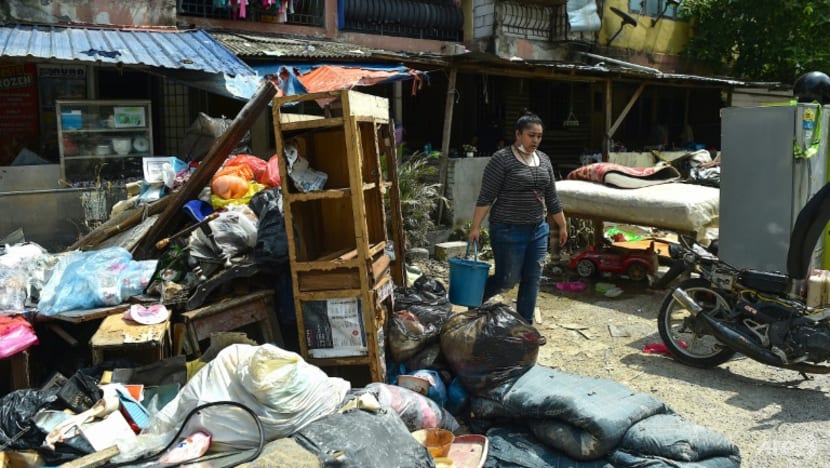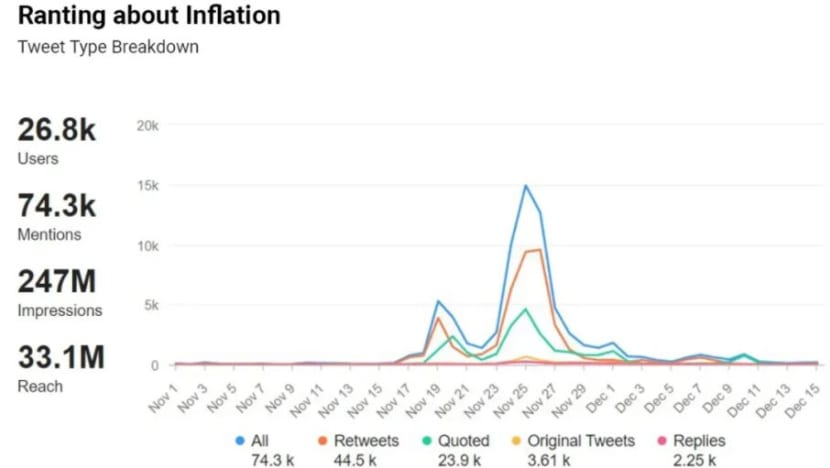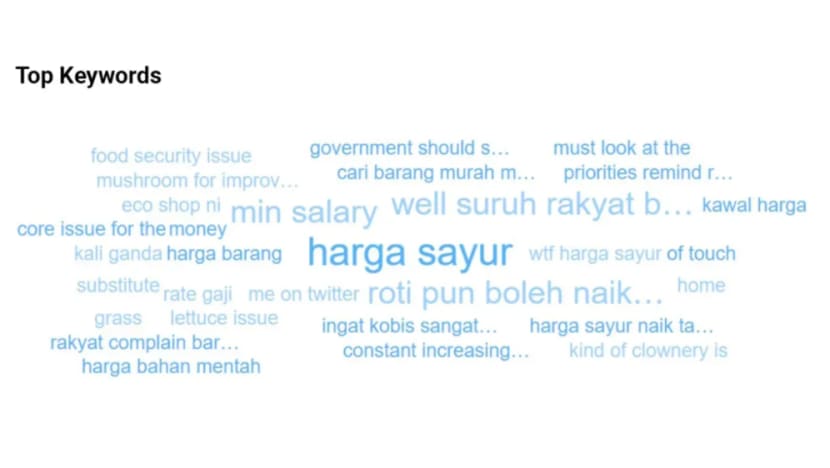Commentary: Inflation and rising prices worsen Malaysia's flooding woes
Even though the price hikes are due to external factors, Malaysian netizens are training their ire on their government, says a researcher.

SINGAPORE: The rising prices of daily necessities in Malaysia have led to rising levels of mercury in the country’s online space.
In the second half of November 2021, inflation became a hot topic on Malaysian social media. Netizens took to social media to complain about the rising costs of daily necessities such as poultry and vegetables.
The online chatter provides some insights not only about Malaysians’ grievances about the increasing prices, but more crucially, their dissatisfaction with the Government’s handling of the situation.

There was a spike in the number of mentions about inflation from Nov 23 to 27, 2021. This was partly due to government and news reports about the exponential rise in prices of daily necessities.
For example, on Twitter, Malaysian newspaper Harian Metro published an infographic summarising the increases in vegetable prices. The tweet received thousands of retweets, where many bemoaned the government’s handling of prices of food staples.
STAGNATING WAGES
Twitter netizens brought up another important issue regarding inflation – wages were not increasing in tandem with inflation.
Many pointed out that wages have been kept low for many years while the cost of living has steadily increased. The top tweets about inflation with the most engagements (retweets, likes, and replies) including one by Bernama’s Faizal Hassan, received 18,000 retweets which lamented the issue of wages.
Many emphasised that wages, especially the minimum wage, have been low for the past few years. Two of the most common phrases mentioned when discussing rising prices were “minimum salary” and “rate gaji” (wage rates).

To its credit, the Government sought to engage with netizens on the issue. The Ministry of Domestic Trade and Consumer Affairs (KPDNHEP) is the main body entrusted with ensuring that prices are kept reasonable for consumers.
Since Nov 22, 2021, it has made many posts about the issue. Several posts urged consumers to shop smarter, such as by using the KPDNHEP’s mobile application that allows users to compare prices between shops.
The ministry’s posts also sought to clarify the extent of inflation and to fact-check viral posts, such as those that claimed that the price of vegetables had tripled. However, these ministry’s social media posts were met with a lot of flak.
On Twitter, many users retweeted tweets describing KPDNHEP’s social media posts as a form of “clownery” and called the KPDNHEP a “waste” of government resources.
Another one of the most popular phrases retweeted was “not y’all gaslighting”, which referred to a tweet about how the KPDNHEP has shifted the blame onto the rakyat for the rising costs of goods.
The netizen pointed out how a KPDNHEP infographic blamed shop owners’ greed and monopolisation for the increase in prices. This is untrue because there were many testimonies by shopkeepers and other authorities that cited reasons like poor weather and an increase in the cost of production for the price hike.
LITTLE TO DO ABOUT PRICE HIKES
Netizens also trained their ire on politicians’ handling of the situation. For example, Prime Minister Ismail Sabri made several Facebook posts addressing inflation, only to be countered with criticisms of his government.
According to shop owners as well as the authorities, the root causes for the price hike were external factors such as the increase in prices for imported fertilisers, petrol, and environmental factors like constant bad weather.
Such factors affected the prices of vegetables and poultries, many of which are domestically produced (Figure 4). Hence, controlling prices is not a straightforward issue. The prices of domestically produced goods rose because the prices of their imported inputs had become costlier (and are not easily controllable by the government).
Meanwhile, Malaysia had in 2020 imported around RM55.5 billion (US$13.3 billion) of food like chilli and mutton as well as commodities like cooking oil. These products experienced a price hike from overseas producers and hence limits much of the KPDNHEP’s ability to control their prices effectively.
In the interim, the government has come up with several short-term solutions to tackle the price hike such as importing 200 container loads of chicken and stopping fish exports. Such a solution aims to temporarily increase the supply of food to reduce scarcity, therefore helping to establish some control over the prices.
Related:
Nonetheless, these solutions are only short-term in nature because they do not tackle the root causes of the price hikes.
PUBLIC ANGER AT GOVERNMENT PERSISTS
Despite the government’s efforts to respond to the situation, it has little online approval of its handling of inflation and problems associated with the rising costs of living. It could be said that the Government failed on two counts: To communicate the deeper causes behind the price hikes, and coming up with policies to either rein in price hikes or tackle the issue of stagnating wages.
While the former is not entirely in the Government’s control, they have failed to address the latter, which is in fact within their control.
Much of the attention that the rakyat, media and authorities gave to inflation has now been diverted towards the floods which have ravaged several parts of Malaysia since Dec 16, 2021.
While it is a different issue, the social media posts exhibit similar sentiments, where netizens flayed the government for its slow and inadequate flood response. The floods have added another line of attack for netizens to criticise Putrajaya’s handling of inflation.
Amirul Adli Rosli is a Research Officer at the Regional Social and Cultural Studies Programme at the ISEAS – Yusof Ishak Institute. This commentary first appeared on ISEAS – Yusof Ishak Institute’s Fulcrum.


















